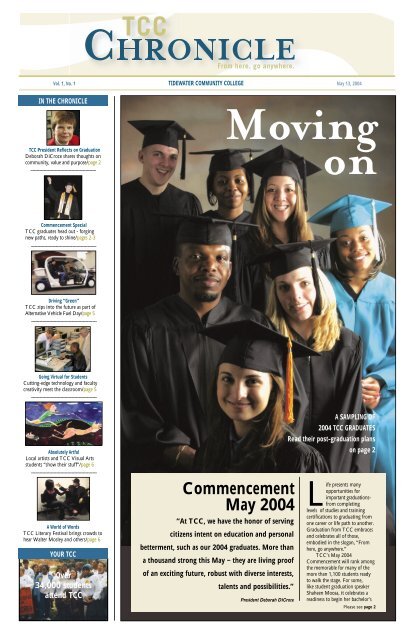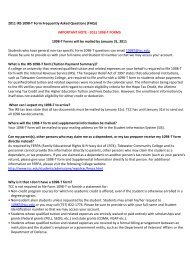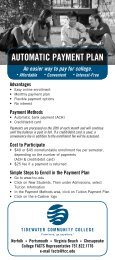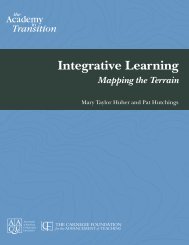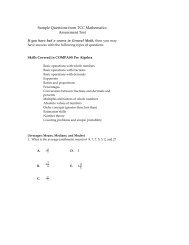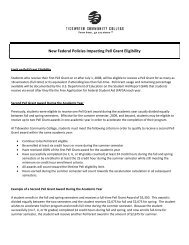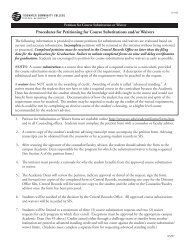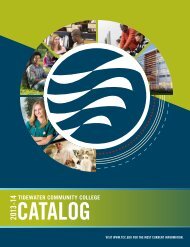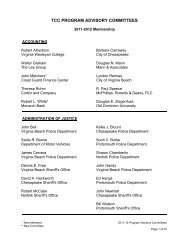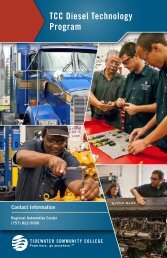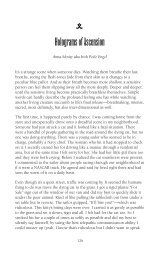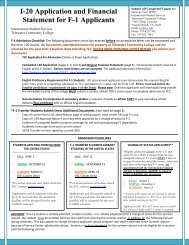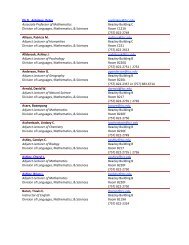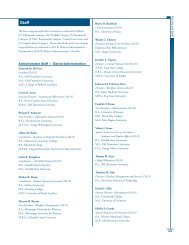Commencement May 2004 - Tidewater Community College
Commencement May 2004 - Tidewater Community College
Commencement May 2004 - Tidewater Community College
- No tags were found...
Create successful ePaper yourself
Turn your PDF publications into a flip-book with our unique Google optimized e-Paper software.
Vol. 1, No. 1TIDEWATER COMMUNITY COLLEGE<strong>May</strong> 13, <strong>2004</strong>IN THE CHRONICLETCC President Reflects on GraduationDeborah DiCroce shares thoughts oncommunity, value and purpose/page 2Movingon<strong>Commencement</strong> SpecialTCC graduates head out - forgingnew paths, ready to shine/pages 2-3Driving “Green”TCC zips into the future as part ofAlternative Vehicle Fuel Day/page 5Going Virtual for StudentsCutting-edge technology and facultycreativity meet the classroom/page 5Absolutely ArtfulLocal artists and TCC Visual Artsstudents “show their stuff”/page 6A SAMPLING OF<strong>2004</strong> TCC GRADUATESRead their post-graduation planson page 2A World of WordsTCC Literary Festival brings crowds tohear Walter Mosley and others/page 6YOUR TCCOver34,000 studentsattend TCC<strong>Commencement</strong><strong>May</strong> <strong>2004</strong>“At TCC, we have the honor of servingcitizens intent on education and personalbetterment, such as our <strong>2004</strong> graduates. More thana thousand strong this <strong>May</strong> − they are living proofof an exciting future, robust with diverse interests,talents and possibilities.”President Deborah DiCroceLife presents manyopportunities forimportant graduationsfromcompletinglevels of studies and trainingcertifications to graduating fromone career or life path to another.Graduation from TCC embracesand celebrates all of those,embodied in the slogan, “Fromhere, go anywhere.”TCC’s <strong>May</strong> <strong>2004</strong><strong>Commencement</strong> will rank amongthe memorable for many of themore than 1,100 students readyto walk the stage. For some,like student graduation speakerShaheen Moosa, it celebrates areadiness to begin her bachelor’sPlease see page 2
2 TCC CHRONICLE > <strong>May</strong> 13, <strong>2004</strong>“At TCC, we have the honor of servingcitizens intent on education and personalbetterment, such as our <strong>2004</strong> graduates.More than a thousand strong this <strong>May</strong> -they are living proof of an exciting future,robust with diverse interests, talents andpossibilities.”Welcome to the commencementseason of spring <strong>2004</strong>. As energy levelssizzle at the college—from the 1,000-plusstudents finishing their coursework tograduate to the hundreds of faculty andCOMMENCEMENT <strong>2004</strong>Reflections on graduationby TCC President Deborah DiCrocestaff readying exams and computing finalgrades—I realize with renewed clarity theutter significance of what we do hereat TCC.For we are a community, a family ifyou will, forging new frameworks fornew futures—every day. Collectively,from student to staff member, wedetermine the value, the strength,the very fabric of this college. And,collectively, TCC’s breadth and scopereach into more areas and touch morelives than ever before.Indeed, as we celebrate the success ofour students and their “beginning again,”we simultaneously seek new ways to meetthe needs of our community, includingour many alumni, their families andneighbors. At TCC, that means addingand evolving services, programs,infrastructure and facilities.Consider, for example, that when ournewest alumni, the class of <strong>2004</strong>, visitthe college in a year or two, they will findchanges that will amaze. They will seebeginnings of the new 80,000-squarefootScience Building at the VirginiaBeach Campus; an elegant arboretumat the Chesapeake Campus; updatedstudios and digital facilities at the VisualArts Center. They will spot progresstoward construction of the 160,000-square-foot New Portsmouth Campus atVictory Crossing and the 30,000-squarefootregional Automotive TechnologyCenter at the Oak Brooke Business Parkin Chesapeake.On K-12 community connections,alumni will find TCC expanding its dualenrollment options across the region’shigh schools and enhancing its teachingof U. S. History “through the local lens”of a nationally recognized program forhigh school teachers taught by TCCfaculty. They will also find a Middle<strong>College</strong> program that will soon launchin Norfolk, linking at-risk youngsters togoals for college and new beginnings.To be sure, beginnings for many ofour students mean new roads to success.These include life-changing avenueslike Bridges to the Future that connectstudents with area baccalaureate colleges,Job Skills Training certificates that secureour graduates good-paying jobs, andindustry certifications that peg teensto careers within a year of high schoolgraduation.Equally, students turn to TCC asthe on-ramp to baccalaureate educationand beyond. And so we find ourselvesconstantly establishing on our own“Grounds” new four-year linkages likethe University of Virginia’s Bachelorof Interdisciplinary Studies, which willofficially launch in <strong>2004</strong>-05. At the sametime, our commitment to respondingproactively to the needs of the workforcehas never been greater, as we continue toopen new doors for employee training,certification in emerging fields such ascomputer technology, and internshipsor apprenticeships that strengthen boththe employer and prospective employee.Our many partners in this enterprise runthe gamut, from the Bank of America toStihl to Cox Communications, from theship repair industry and healthcare to theautomotive industry and tourism.It’s true, you know: From here atTCC, the thousands we serve can goanywhere. And Hampton Roads is thericher for it. You are at the heart of oursuccess, colleagues. Many thanks forbeing a part of this exciting journey.<strong>Commencement</strong> <strong>May</strong> <strong>2004</strong>Who: More than 1,100 studentsWhen: 7 p.m., <strong>May</strong> 14Where: Ted Constant Convocation CenterOld Dominion UniversityNorfolk<strong>Commencement</strong>Continued from page 1degree. For speaker runners-up FlorestineWatkins and Dean Lacy it signifiessuccess with personal challenges andcareer changes. (Their stories andgraduation essays appear on page 3.)For Samuel Cox, making hard lifechoices - grounded in faith, upheld byperseverance and supported by family- tests what you’re made of, but fuelsthe spirit. Cox, a 2001 alumnus whograduated from Virginia Wesleyan<strong>College</strong> in 2003, changed careers andlifestyle through education. And, alongthe way, he inspired his family to enrollat TCC. Now he speaks to studentsgraduating from the Open Door Project.(See his story on page 6.)TCC faculty, staff and administrationshare in each graduate’s success. Many ofthe 1,160 instructors at TCC will joinin the ceremony that begins at 7 p.m.on Friday, <strong>May</strong> 14, in the Ted ConstantConvention Center at Old DominionUniversity in Norfolk.“This is a special time for ourstudents and the entire TCC community,”says President Deborah DiCroce. Froma few hundred students graduating inTCC’s early years, the 1970s, to morethan 2,000 who now graduate annually,TCC has grown to serve citizens in fivecities - Chesapeake, Norfolk, Portsmouth,Virginia Beach and Suffolk. Studentsnow range from hundreds in the militaryto dozens of ship-repair personnel tothousands of employees in health-care andbusiness industries to many others intenton transfer to bachelor’s degree programs.“Our 34,000 students come fromall walks of life and possess as manydiverse interests as you would expect tofind in a thriving metropolis,” adds JohnDever, vice president of academic andstudent affairs. “We’re proud of theiraccomplishments and are not surprisedwhen we hear of their later successes inlife.”TCC’s <strong>May</strong> <strong>Commencement</strong> student speaker Christine Shaheen Moosa graduates with twodegrees, in performing arts and general studies. She will attend Sweet Briar this fall.Speaking out –Graduate takescenter stageComing to TCC changedChristine Shaheen Moosa. Nolonger the quiet, unassumingstudent, she’s happy to speak hermind, and will have that chance as this <strong>May</strong>’sstudent graduation speaker.After graduating from Great BridgeHigh, Moosa knew she wanted to furtherher education, but also knew a four-yearcollege would be difficult to afford. TCCseemed like the perfect option. Moosa,a self-described “floater” in high school,found herself at TCC. “I’m a totallydifferent person today because of my TCCexperiences. I’m more confident, moreopen to life’s possibilities,” she explains.Moosa has been very active at TCCfor the past two years, now serving as vicepresident of the Student GovernmentAssociation for the Chesapeake Campus.She also serves as a member on the collegewideStudent Federation and is vicepresident of service for the ChesapeakePhi Theta Kappas. She was also TCC’sattendant in this year’s Azalea festival anda student ambassador, working to recruitnew students. Moosa has been active inthe theatre department as an actor, setdesigner and director. “TCC has been sogood for me,” Moosa says. “It hasn’t beenthe typical college experience. Here I’vehad the chance to work with all kinds ofpeople, from military commanders to PTApresidents.”Moosa graduates TCC with twoassociate degrees - one in general studiesand another in performing arts. She wasoffered a full scholarship to Sweet Briar<strong>College</strong> in Amherst, Va., for the fall, andis considering all her options. “Two yearsago I couldn’t find the nearest Starbucks,”Moosa adds. “Now I’m ready to move on.I’ve been given a fresh start, and from hereI know I can go anywhere.”Graduates lookto robust futurePaul Jeffreys – Aphotography major withan artistic bent, Paulmoves on to the CorcoranSchool of Art and Designin Washington, D.C., thisfall. His talented “eye” focuses on ceramicsas well as photography, both of which hestudied at the Visual Arts Center. “TheVAC facilities are awesome; and I’m friendswith all my teachers - they’re amazingworking artists . . . When I finish school,I want to freelance for magazines likeNational Geographic.”Michele Copeland – Intenton a career in humanservices counseling orsocial work, Michellemajored in sociology/general studies at TCC,where her mom, Wanda Franklin, works.“My professors were great, and onlineclasses - their convenience - really helpedme get everything I needed, plus work parttime. With TCC’s perfect transfer matchfor sociology at ODU, it’s worked outreally well.”Christina Williams – Withan end goal of runningher own company,Christina devoted herstudies to graphic designand computer graphics,spending many long hours in the computerPlease see page 3
Sam Cox Jr.to share insightsat Open DoorcelebrationAttending college was alwaysa dream, something to hopefor, says this year’s Open DoorProject graduation speaker, SamCox Jr. In his family people went to work,not college. After many years as a civilianmariner for the United States Navy, Cox’sbad knees kept him off deck and eventuallylanded him out of a job.Cox had to retrain himself so hesigned up at TCC. “I always wanted to bea child-advocate lawyer,” Cox says. “Withmy family depending on me, I went backto school and was serious about what I hadto do.”At first Cox was overwhelmed bythe rigors of the classroom, after spendingclose to three decades away from academia.In order to take advantage of governmentGraduates look to futureContinued from page 1lab. “I want to get into magazines and TVfirst; I feel ready and well prepared. Thisschool - for such hard work - it’s been easyto be here.”Nicole Wade – A newgraduate of TCC’s JobSkills Training program,Nicole plans on arewarding career whilesupporting her two littlechildren, Kyseen and Jazmine. She startswork in customer service at PortfolioMagazine in <strong>May</strong>. “I see a challengingcareer and a future of coming back toschool.”Lee Beechboard – Ascholarship exposed Leeto the inner workings ofthe VAC gallery whileearning her degree inphotography, sumacum laude. “My time at TCC has beenreally fun, especially being a part of PTK.I’ve learned to juggle a lot; I started atTCC when my daughter was eight andmy husband was deployed, while takingcare of my 90-year-old grandma and our300-acre farm . . . My goal is to set up aportrait studio in five years.”Dwyane Taylor – A retired24-year naval officer,Dwyane decided to moveon to a new chapter in hislife. He chose computernetwork engineering atTCC, and now plans to pursue a bachelor’sin computer science at Old DominionUniversity. “It was a real challenge toreturn to school after I’d been out so long,like exploring the unknown. But I’m readyfor the next step now.”Ariel J. Lippman –Christopher Newport<strong>College</strong> will number Arielamong its students thisfall. She’ll pursue a mathdegree, preparing her toteach and, eventually, earn a doctorate andjoin a team of integrated engineers whereshe can apply her math skills. “My TCCinstructors are experts in their field, andthey’ve been so supportive ... I’ve enjoyedbeing involved at TCC, especially as SGA/Chesapeake president.”TCC CHRONICLE > <strong>May</strong> 13, <strong>2004</strong>COMMENCEMENT <strong>2004</strong>Sam Cox has a lot to say to kids about getting an education. As a truant offi cer in NorfolkPublic Schools, Cox toils daily keeping kids on track. Top right, Sam with his wife and son.retraining funding, Cox had to take afull load that first semester. He managedto make the adjustment and his nameappeared on both the Dean’s List andPresident’s List at the end of the term. “Ididn’t think I was going to make it, butGod showed me differently. I couldn’thave done it without the guidance of DeanClark and Ms. Williams - they helped withthe red tape, guided me towards a courseof study and were always there for me.”While at TCC Cox participatedin the Open Door Project, a federallyfundedstudent-support services programlaunched in Norfolk and Portsmouth in1997. The program focuses on helpingstudents improve academic performance,staying in school and graduating fromStellar CandidatesTCC’s <strong>May</strong> <strong>2004</strong> student-speakercandidates were selected for theirscholarly achievements, as well as theircommunity and campus involvement.Together, they represent the talent, driveand diversity of the TCC student body.Student Graduation SpeakerChristine Shaheen Moosa(Graduation remarks excerpt)I really floundered around for my firstsemester at TCC as I began learning newwords like provost and syllabus. By secondsemester I realized that I couldn’t stay atTCC forever and I was going to have totransfer. Eventually I was going to have todecide what to do with the rest of my life.So I decided I wanted to go somewhereprestigious, and when an admissions officerfrom another college told me they wouldn’tbe looking at my high school records, Iknew this was it, TCC was my fresh start.I started joining everything I could tobulk up my transfer application, Phi ThetaKappa, Student Government Association,and I became a student ambassador. This iswhere I really started to get to know whatcommunity college is about. As a studentambassador I helped enroll new students.During one enrollment week I met a guywho wanted to come back to school. Now,he had been out of school for more yearsthat I had been alive, and he was petrifiedof the placement test. It took me the betterpart of two hours to get him in there. Ifinally told him, “So what if you don’t dogreat on the placement test, so what if youhave to take some developmental classes,at least you are here, at least you are doingsomething.”This is where I really started to getwhat community college and educationis about. It is about educating yourself soyou have choices and finding the courageto make the right choices. That gentlemanis in his third semester at TCC and I talkwith him sometimes while I’m working atthe welcome desk.I am so glad that I came to TCCTCC or transferring to a four-year collegeor university. “Through Open Door I gota little extra support, things like tutoring,listening to motivational speakers andeven a mentor if I wanted one. It was areal help,” Cox says. He also started a clubcalled the Royal Ambassadors and was aparliamentarian for the student body.Cox graduated from TCC with anassociate degree in 2001 and transferred toVirginia Wesleyan <strong>College</strong>. In December2003, he earned his bachelor’s and nowplans to work towards a law degree. “WhenI graduated I couldn’t believe it. I’m theonly one in my family in this generationwho finished college,” Cox explains, “Icouldn’t have done it without TCC and God.”Cox is back at school these days,because I don’t think that I could havehad this experience anywhere else. Whereelse can I take theatre with an ex-militarycommander, exchange notes with someonefrom a foreign country and become friendswith a mother of two who balances PTKmeeting with PTA meetings.So, maybe everybody who wasanybody in high school went away tocollege. I stayed right here, and from here Iknow that I can go anywhere.Dean LacyStudent speaker runner-upDean Lacy returned to the classroomafter 20 years, while continuing to servein the United States Navy. Lacy is marriedwith three children, ages nine to 19.Lacy graduates with an associate degreein business administration and plans tocomplete a bachelor’s degree in engineeringtechnology and management at OldDominion University.“In getting this degree, thebiggest obstacle for me wasworking full time, being involvedwith the family and going toschool. At times it was diffi cult,but it was certainly worth it.”Florestine WatkinsStudent speaker runner-upAfter many years in the workforce,Florestine Watkins began attending classesto expand her skills. Unsure of her abilityto learn after a stroke left her with someshort-term memory loss, Watkins’ sheerdetermination enabled her to excel in allareas of campus life. Watkins now servesas president of the Student GovernmentAssociation for the Portsmouth Campus,member of the college-wide federation andsecretary of the Portsmouth Phi Theta Kappas.An active participant in the OpenDoor Project, Watkins serves as a mentorfor first-year students. Married for 23 yearswith a son, age 17, she graduates with an3working as a truant officer/attendancetechnician. He handles Norview HighSchool, Norview Middle School,Coronado High School and otheralternative schools. “My education hasalready opened up a lot of doors. I’menjoying this work better than anythingI’ve done before,” Cox adds. “It doesn’t paythat well, but I’m not in it for the money.We have a roof over our heads and we eatwell. For me, now it’s about being an assetto my community.”In his current job, Cox works hard toensure “his” kids are in school. He works inthe courts frequently and feels he is gettingcloser to his dream of becoming a childadvocate lawyer. “I’m working with judges,watching lawyers, learning the ropes. I’mright where I need to be,” he adds.In an interesting turn of events,TCC now welcomes two more membersof the Cox family. Cox’s wife Geraldineis in her first semester studying businessadministration. His son Rafael, 18, in hissecond semester, is working toward a generalstudies degree. “TCC has changed all of us,”Cox says. “It has shown us so many newpossibilities. It’s a dream, really.”Student speaker runners-up: Top photo,Dean Lacy. Bottom photo, Florestine Watkins.associate degree in business administrationand plans to obtain a master’s degree inaccounting from Old Dominion University.“I wanted to be challenged, that’s why Iwent back to school. The transition wasdifficult, getting into the groove of it all.Now I’m graduating, I know I can doanything that I set my mind to do.”Project Graduation seeks books and foodAgood deed at graduation: studentsand their guests can remembertheir last TCC days through gifts ofreading and food. Phi Theta Kappa askseveryone attending graduation to bringa canned food item or a new book forProject Graduation to help people inHampton Roads. Donated books willfeed the minds of families in crisisand others through the HuntersvilleMulti-Services Center, PARC, HER-The Shelter for Abused Women andChildren, and <strong>Tidewater</strong> LiteracyCouncil. Canned goods will go tohungry children and adults through theFoodbank of Southeastern Virginia.
4 TCC CHRONICLE > <strong>May</strong> 13, <strong>2004</strong>TCC pilots innovative industry certification programTo focus on seniors withno plans for collegePlanning a career for post-highschool will become a little easierfor 100 or so seniors in SouthHampton Roads this summer.As a part of Gov. Mark Warner’sEducation for a Lifetime initiative,<strong>Tidewater</strong> <strong>Community</strong> <strong>College</strong> has beguna pilot program with up to 27 SouthHampton Roads high schools for selectseniors interested in industry certification.The pilot program at TCC - one offour launch sites in the state - will startin June with approximately 100 justgraduatedstudents from Chesapeake,Norfolk, Portsmouth, Suffolk and VirginiaBeach schools. The statewide head countwill be at least 200 and will multiply manytimes over as it expands later this spring toinclude next-year seniors.Students, selected by counselors at theirhigh schools, can choose from 13 TCCprograms. They must complete the SeniorYear Plus, Path to Industry Certificationprogram within nine months of graduation.“This is a critical time to educateour youth who want to step into goodjobs through certification, simultaneouslyaddressing industry workforce needs.Clearly, this is a forte of communitycolleges,” says TCC President DeborahDiCroce. “We’re pleased to apply TCC’slong-held expertise in career preparationto this important program for select highschoolseniors who may lack the skillsneeded to enter the 21st century workforce.“The Industry Certification programwill give these students impetus to earntheir diploma and immediately followthrough on a certification path, with notuition costs to them,” adds DiCroce.The program requires students andtheir parents to sign a Student Compact.The compact states that the student willcomplete high school and then enrollin technical training to acquire theappropriate skills and certifications to entera career. Students also complete an “interestinventory” to best match a certificationStudents interested in the real estatecertifi cate listened to Ann Ambrose, dean ofbusiness, public services and technologiesat the Portsmouth Campus.program with what they enjoy doing.Industry certification curricula inwhich selected seniors can enroll at TCCinclude real estate, nurse aide, emergencymedical technician, greenhouse operator,automotive, restaurant operations, lodgingmanagement, welding, computer graphicsprograms Photoshop and Fireworks, IC3,and Microsoft Office specialist. TCC willprovide career counseling in the program.“Building on the launch this summer,we expect the number to more than doubleat TCC next year,” predicts Diann Holt,associate vice president for occupational/technical education at TCC and coordinatorof the pilot program at the college. Holtworked with TCC academic divisions toselect best-fit curricula for high schoolseniors, many with little or no training intheir respective certification program.The other three Virginia communitycolleges piloting the program areDanville <strong>Community</strong> <strong>College</strong>, New River<strong>Community</strong> <strong>College</strong> and Patrick Henry<strong>Community</strong> <strong>College</strong>. Five more collegeswill join the pilot as it expands to includenext-year seniors.To learn more about Gov. Warner’sEducation for a Lifetime initiative,visit http://www.governor.virginia.gov/Initiatives/Ed4Life/index.htm.Dr. Quinton Bullock and Antwawn Branch meet regularly, part of Beating the Odds.TCC mentors help “beat the odds”What do you do when you’re a youngman fresh out of high school or ina dead-end job and you want to make achange? Hopefully, you sign up at TCCand get hooked up with the new Beatingthe Odds program - the vision of NorfolkCampus Provost Quintin Bullock andcounselor Carolyn Williams.“Statistics show us there is a decreasingnumber of men enrolling in communitycollege, and fewer who persist with theirstudies,” says Bullock. “Seeing that trendon our own campus, we decided to start aprogram to equip these students for success,to see them walk out our doors with adegree or a certificate and a career plan.”The Beating the Odds program beganlast year and now serves about 20 regularmembers, along with many others whosimply attend a meeting or two. Williamsserves as the group’s advisor and organizesbi-weekly meetings, arranges speakers andacts as the group’s liaison between facultyand staff. “This group includes youngmen with full-time jobs, children, andreal-life responsibilities,” says Williams.“By getting them together they’re able tosupport each other, learn from each otherand stay motivated to keep on track withtheir studies.”Antwawn Branch has been attendingthe program since it began. “I alwayswanted to run my own business, so Idecided to get an education, to enhancemy income and my skills,” Branchexplains. “But it’s real tough to do it all,especially when you’re holding down a fulltimejob and raising kids. I almost withdrewfrom school, but Ms. Williams encouragedme and the group helped keep me going.”Throughout the year the groupdecides what they want to discuss andWilliams arranges guests to addresspertinent topics. At a recent meeting,John Horton, diagnostic probation officer,Norfolk Juvenile and Domestic RelationsCourt, spoke about leadership and whatit really means to be a father. At anothermeeting, Tyrone Davis, executive director,Educational Opportunity Center, talkedabout the importance of education anddiscussed strategies to overcome obstacles.He also gave members hard facts on thekind of jobs available with and withoutan education. And at another gathering,Margo Simmons, a counselor in the Officeof Financial Services, talked about theresources available through financial aid.In February the program expanded toinclude mentors, men who are communityleaders and successful in their fields.Mentors attend meetings and spend fivehours a month with assigned students.“As an adjunct at TCC I’ve seen alot of students struggle with emotionaland social issues and not make it,” saysStacy Clark, senior parole officer, NorfolkDepartment of Juvenile Justice. “I decidedI wanted to be there to help. If I’d hadguidance from someone successful I mighthave made different choices and now becloser to my goal of getting a Ph.D.Against the odds, this pilot programis working. “This new model for supporthelps male students connect, to have acomfort zone where they can share theirexperiences,” adds Bullock. By linkingour students with men who are successful,we’re showing them their own potential forsuccess.”Well into its second year, this programis helping to beat the odds. Branch adds,“I’d like to encourage more guys to attendthe meetings. So many things come yourway that are negative - and this is a realpositive.”“Bridges” helps a future toxicologistTensis Nicholson, a single mom withthree young children, never thoughtshe’d be able to leave her 9-to-5 job toget an education. A Saturday morningchanged all that.Nicholson attended Transitions,a TCC Women’s Center welcomeconference, and learned how other womenbalance work, family and academics. Shealso learned of the many resources availablefor non-traditional students. “Duringthat orientation I made a decision to getthis education for my future and my kids’futures,” says Nicholson. “The staff andfaculty at TCC have been so helpful andoutgoing; they’ve made it easy to go back.”In her second year, with 45 hourscompleted, Nicholson is now a participantin the Bridges to the Future program,which began in 2001. The program,funded through the National Institutesof Health, encourages under-representedminorities to pursue careers in biomedicalresearch. “I started out studying computerscience, but through this programdiscovered my interest in the appliedsciences,” Nicholson explains.Students who participate in Bridgesto the Future begin by attending aresearch orientation workshop and arethen assigned a research project. “Wetry to match the students’ interests tothe projects. The result is exposure tomany different areas,” explains ProgramCoordinator Janina Arrington. “TheseBridges to the Future,funded through the NationalInstitutes Health, encouragesunder-represented minoritiesto pursue careers inbiomedical research.students go on to make contacts, receivescholarships and obtain internships.”In January Nicholson was invited toattend a mini-research internship withBrookhaven National Laboratory in NewYork. While there she tested cigarette filtersto see how much smoke is really blocked.“The results were surprising,” she reports.“We found the filters to be quite useless.”This spring, Nicholson began a paidinternship with TCC’s program partner,Norfolk State University. She works withKenneth Hicks in the chemistry lab andis getting hands-on experience testing thereaction time of different enzymes. “Thisinternship is such a gift. It allows me topursue my studies, while paying the bills.”For Nicholson, new possibilities fillher life. “I’m working hard to have a careerin toxicology research,” says Nicholson.“Life is very demanding, but it’s all worth it.My kids are now competing with me to seewho can get the best grades. I’m in the lead,but we’re all doing better because of this.”Bridges to the future linked Tensis Nicholson to a career in research and science.
TCC CHRONICLE > <strong>May</strong> 13, <strong>2004</strong>5RESEARCH ZONEStudents Jerry Schmoyer (left) and William Jguedjo work with “lab-on-a-CD” underprofessor Al Koon’s helpful eye. A virtual weather-project screen is pictured below.“Virtual” technologymoves TCC electronicsImagination. Drive. And adream. These elements led tothe development of software thatbrings “virtual instruments” tolife in TCC’s electronic engineeringtechnology (EET) classes.For more than three decades, EETclasses have been offered at TCC, butwith the opening of the AdvancedTechnology Center at the VirginiaBeach Campus and recent grantfunding from the National ScienceFoundation, the program has taken offin a new direction. “We’re not teachinganything new to our students, but we’representing the information in a wholenew way,” explains Al Koon, programdirector and EET professor for TCCsince 1975.The newelectronicsengineeringtechnologylabs are onthe cuttingedge, witheach stationrunning theEducationalLaboratoryVirtualInstrumentationSuite, known as ELVIS - a groupof virtual instruments donated byNational Instruments including digitalmultimeters, oscilloscopes, functiongenerators, digital readers and bodeanalyzers. The lab also has touchsensitivewhite boards that interactwith each lab-station computer screen.Lectures are now truly interactive -students can see computer-generatedapplications and the professors’ lecturenotes right on the screen in front ofthem. At the end of class they leave witha CD of the entire lecture experience.To make the transition to a virtuallab, Koon used the LabVIEW operatingsystem to write new software to integratethe technology into the classroom. Theresult: now students can “play” withelectronics equipment on the computer,they can change frequencies and otherfactors and see what happens. “Themore you play with something, the moreyou learn it and this is especially true fortoday’s students who grew up playing oncomputers,” explains Koon. “The newsoftware allows students to learn difficultEET principles through trial and error,and at the end of the program they cansee if their thinking is correct.”Before the advent of this technologystudents would learn the material onpaper using formulas, and they couldn’tcheck their own work. Now they can takea CD home, pop it into their computerand get to work. Because Koon wrote thesoftware, he can offer it to students freeof charge. “This is a dream and after yearsof work it has all come together,” Koonadds. “I can’t think of a better way to teachthis material. Students can now designelectronics, troubleshoot and it’s fun.”While Koon encourages students touse the virtual tools, he is quick to note theimportance of using the real equipment inthe lab. “We want our students to gethands-on training with this equipment,”says Koon. “But we also know theequipment is far too expensive to keep athome, and thevirtual toolsand softwaregames allowstudents tolearn thematerial on ahigher level.”Today, morethan 40 of 75labs in theEET programuse this virtualtechnology.In a course developed by associateprofessor Wayne Blythe, students are evencreating a virtual weather station thatmeasures the temperature, wind speed,rainfall, the UV index, pressure and otherweather-related elements. This summer,Koon and Blythe hope to turn the virtualweather station into a real workingmodel. The data will be transmittedthrough wires into the lab, processed bythe LabVIEW software and read by aconnected computer. The information canthen be sent through TCC’s closed-circuittelevision monitors throughout the college,placed online on the TCC website or evenused by a local weather station.Only two schools in the world teachthe LabVIEW developer curriculum,and TCC is one of them. In fact, withonly 211 LabVIEW developers in thenation’s workforce, TCC’s curriculumfocuses on unmet industry needs. “Youdon’t often think of a community collegeas a research facility, but at TCC we’reon the cutting edge of this technology,”Koon adds. “Eventually we hope to makethis prototype available to local highschools and other institutions in the Virginia<strong>Community</strong> <strong>College</strong> System and beyond.”Learning-centered thinking guidesplans for new Portsmouth CampusReinventing the campus from theground up - that’s the goal of facultyand staff of the Portsmouth Campus, asthey plan a move to a new site within theCity of Portsmouth in the next four years.Becoming a learning-centered campus is atop priority.“We have a unique opportunity toembrace this national movement and builda campus that is entirely dedicated tolearning - from our facilities to our facultyto our support services; everything willfocus on learning,” explains Acting ProvostTerry Jones.Earlier this year, a team fromthe Portsmouth Campus attended anAmerican Association of Higher Education(AAHE) workshop that addressed themost recent research on learning. Morethan 30 colleges and universities wererepresented, with four-year institutions faroutnumbering the community colleges.Representing TCC from the PortsmouthCampus were: Lorenz Drake, Terry Jones,Angela Mason, Marilyn Peacock, KittyPerkinson, John Massey, Joe Reish, LarrySaffioti and David Steinhauer.At the workshop, each team submitteda project on the topic of learning. Inthe midst of some stiff competition, thePortsmouth project took first place in onecategory and tied for second in another.“We were thrilled to be recognized by thisgroup,” says Jones. “At the communitycollege level we understand the learningprocess, and it shows.”The team from the AAHE workshopcontinues to meet and has become thecore group working to transform thePortsmouth Campus into a learningcenteredenvironment. To become learningcentered two questions must be answeredwhen making decisions - does this actionimprove and expand learning and howdo we know? “In planning for the newcampus, becoming learning-centered is ourorganizing principle,” Jones says. “It guidesour thinking from how we build, to whatand how we teach.”According to Terry O’Banion of theLeague for Innovation in the <strong>Community</strong><strong>College</strong>, a learning-centered campus isbased on six principles and Portsmouthhopes to incorporate all into its plans. Theyinclude: creating a substantive change inindividual learners, engaging learners inthe learning process as full partners whoInitial Thoughts:Components & Interactions for Developing a Learning <strong>College</strong>must assume primary responsibility fortheir own choices, creating and offeringas many options for learning as possible,assisting learners to form and participatein collaborative learning activities, definingthe roles of learning facilitators in responseto the needs of the learners and definingsuccess only when improved and expandedlearning can be documented for learners.“Learning is our product,” explainsJones. “It’s what we do and, in this case, it’sthe measure of our success.”Photo by Mort Fryman/The Virginian-PilotCourtesy of The Virginian-PilotApproved for road rush at 35 MPH...TCC co-hosted the first Hampton Roads Alternative Fuel Vehicle Day in Norfolk on April2, part of a national event to raise awareness of “green” fuel trends. TCC’s automotivetechnology program set up vehicle diagnostic displays with a Toyota Prius and a HondaCivic GX NGV. Area high schools brought students to see the displays and ride in carssuch as the GEM (Global Electronic Motor car), shown here.
6 TCC CHRONICLE > <strong>May</strong> 13, <strong>2004</strong>VAC studentsshow their stuffVisual Arts Center students had thechance to shine at the 33rd annualstudent art show this spring. The showincluded over 216 pieces by 137 students,representing work completed for VACclasses since <strong>May</strong> 2003.Catherine Jordan Wass, deputydirector of operations for the ChryslerMuseum of Art, served as this year’s judge,eying a variety of media from drawingand painting to photography, ceramics,sculpture and glass to computer-generatedimagery and mixed media. For outstandingworks she presented students with morethan 25 awards of excellence and $4,500in monetary gifts, gift certificates andmuseum memberships.Women’s-themeliterary contestdraws 50 entrantsWrapping up its 10-year anniversaryevents, the TCC Women’s Centerannounced winners of the annual Women’sHistory Month Literary Competition onMarch 25. The contest celebrated women’sexperiences expressed by writing on thetheme of “Women as Caregivers.”The contest offered three categories:Historical Essay, telling the story ofa woman no longer living who madea key contribution to U.S. history;Contemporary Essay, telling the story of awoman today who is making a difference;and Poetry, developing the theme ofWomen as Caregivers through creativepoetic form.Close to 50 students from TCC’s fourcampuses entered the competition. Judgeschose entries based on original contentand quality of work. Travis China, StaceyMcGowan and Natalie Perucci won theHistorical Essay category. Amy Blondell,Anna Brown and Shannon Grunewaldwon in the Contemporary Essay sectionand the Poetry category winners wereDanielle Bradley, Ann Demaio and LaurieWeckstein.ARTS AT TCCJamie Nervo Cohan, “Dog Running Girl” 2002, acrylic on canvas, 37” x 78”Bold, embracing art to visit TCCTCC’s Visual Arts Center at 340 High St. in Olde Towne Portsmouth opens its gallerydoors to the delightful Bruner, Cohan, Henry & Rogers: Objects of Wit, Whimsyand Wonder exhibition with the work of four artists, <strong>May</strong> 15 through July 4. TheVirginia artists - Vicki Bruner of Virginia Beach, Jamie Nervo Cohan of Roanoke, GregHenry of Hampton and Deborah Rogers of Norfolk - present paintings, sculpture andmixed media work. Visitors can join the artists for a reception at 7 p.m. on Saturday, June5. Gallery hours are 9 a.m. to 8 p.m. daily; for more information, call 822-6999.The exhibition featured talks by arthistorian Robert Wojtowicz and artist AliceRogan-Nelson. Wojtowicz, chair of the artdepartment at Old Dominion University,spoke about Frank Lloyd Wright inVirginia. Rogan-Nelson, owner of CristalloArt and Glass Studio, lectured about glass:hot, warm and cold fusion.Event sponsors included Camera City,Chrysler Museum of Art, Color Graphicsof Virginia Beach, Eagleton’s Inc., HarrisCamera, Hartung Gallery & Art Supplies,Everett & Ann Johnston, Miller’s Framingand Art, Peninsula Fine Arts Center,Portsmouth Museums, Quality Camera &Photo Imaging Inc., Richmond Camera,Riverview Gallery, TCC Student Activitiesand WAVY-TV 10.The corporate worldshould re-tool forfuture caregivers . . .Renownedjournalist AnnCrittenden, authorof The Price ofMotherhood, spokefor TCC’s Women’sCenter lecture series,addressing howchanges can occurthat benefit women as caregivers, as well asemployers. The series featured accomplishedwomen in various walks of life, from a judgeto an environmental activist.“If you work hard, you’ll get there,” Walter Mosley told about 350 would-be writers and fansat his lecture. Here, the writer responds to “Live from VA” teen host Diamond Black, sayingthat writing today is as important as it ever was, from rap songs to books. (“Live from VA” airsSaturdays at 12:30 a.m. on channel 4 WSKY.)Literary festival touches hundredsTCC’s third annual LiteraryFestival, March 29-April 2,drew full houses and Virginian-Pilot stories on its guestspeakers and local TCC faculty authors.Keynote speaker, famed mystery writerand social activist Walter Mosley gave acontemplative talk on the “literary life”and his love of writing to a 350-strongaudience in TCC’s Jeanne and GeorgeRoper Performing Arts Center.Guest authors Robert Phillips, TimSeibles, John Slade and Susan Wheelerspoke at TCC’s four campuses, joinedby faculty authors and student poetsrepresenting the breadth of TCC talentfrom Hampton Roads. “This was aremarkable festival, with provocativeauthors and a committee that worked veryhard to bring it all together,” says PhyllisGowdy, Literary Festival committee chair.“Each year we improve the processand the involvement. We’re on our wayto making this a landmark annual series,”predicts Gowdy.The festival coincides with annualproduction of juried student literary works,published in the ChannelMarker. Volume3 is available by contacting Gowdy atpgowdy@tcc.edu.Antonio WoodsonRio WessonSlammin’ with words wins kudosMaking sense of the world through poetry may not rank high on many students’agendas. But for two TCC students, their efforts at expressive language resulted innational notice this year.Rio Wesson and Antonio Woodson captured two of four grand prizes at The NationalBlack Leadership Conference poetry slam contest. The special event, Slammin: The BlackWords Poetry Café, hosted by poet and publisher Kwame Alexander, pitted students fromacross the country in a spoken competition.Woodson, a second-semester student at the Norfolk Campus, modestly says, “Itwas my first competition. I really wasn’t that interested in the $200 prize, I just wantedto share my message with the audience.” His poem, “Spiritual Warfare,” talks aboutthe consequences of right and wrong and the struggle people face between the two.Woodson plans to pursue a bachelor’s degree in religious studies at Regent University aftergraduating from TCC.Wesson, an accounting student at the Portsmouth Campus, wrote his poem,“Could You Do It?” originally as song lyrics. He challenges the audience to considerthe significance of Jesus dying for people’s sins and asks if they could do the same. Heperformed on campus as part of TCC’s Black History Month activities.Learning good tasteTCC’s hospitality management andculinary arts’ open house alwaysbrings a crowd to the Granby Street labsin Norfolk. Guests tour the facility andmeet faculty and chef instructors. Theassociate of applied science degrees in bothhospitality management and culinary artsprepare students for executive training andmanagement positions in hotels, restaurants,clubs, catering and other hospitality services.TCC talent hoofs itMore than 20 students from all TCCcampuses auditioned and 12 performed forthe first college-wide Campus Star TalentShow held April 6 in the Jeanne and GeorgeRoper Performing Arts Center. Studentsdanced and rendered their versions of songsand rap. The event, sponsored by Agape onCampus and TCC <strong>College</strong>-wide StudentActivities, drew over 300 to the show.
TCC CHRONICLE > <strong>May</strong> 13, <strong>2004</strong>TCC’s international efforts glean second national awardHong Duc University students taught TCC faculty and students the art of making spring rolls- part of a cultural exchange program between the university and a consortium of VCCScolleges. Here, TCC’s Susan de Veer, center, tries her hand at the delicate process.Fast on the heels of this fall’sPeace Corps recognition andpartnership agreement, TCC haswon a distinguished recognitionfor success in global education programsat a community college. The collegereceived one of three <strong>2004</strong> InternationalIntercultural Achievement Best Practicesawards from the American Council onInternational Intercultural Education(ACIIE) this April.Most notably, TCC’s leadership withthe Vietnam Project won the attentionof ACIIE’s selection team. A consortiumof community colleges in Virginiaparticipated in the Vietnam Project,funded by the National Security EducationProgram/Department of Defense, in2000. Led by TCC, the Vietnam Projectdeveloped opportunities for facultyand students to pursue the Vietnameselanguage, history and culture.TCC began internationalizingits campus in the mid-1980s and hasmaintained its hallmark of a decentralized,faculty-driven approach to globalization.TCC Chesapeake biology students went onsafari to observe the “residents” at VirginiaZoological Park in Norfolk.Catching Zs at the zoo -bunking with rhinosLearning about animals for biologyclass “got real” in April with a trip tothe Virginia Zoological Park in Norfolk.Students from the Chesapeake Campuswent on an overnight excursion - the ZooSnooze - that included a flashlight tour,live animal encounters and lectures aboutconservation and endangered species.The group’s biology professor, LisaBehm, a former Norfolk zookeeper,explains, “It’s great to see the animals westudy, up close and personal. Zoo Snoozeis an excellent experience for every agegroup.” Highlights for the group includeda behind-the-scenes look at the rhinoceros,and encounters with a screech owl, sennecfox, porcupine and armadillo.TCC’s International Education Committeeinvites faculty to join in a seminar <strong>May</strong>17-21. The Summer InternationalizationInstitute III: Infusing Global Content intoYour Teaching offers a content-specificworkshop to assist faculty with weavingglobal elements into their courses. It will beheld at the Norfolk Campus; call 822-7296for application materials or information.The process began with establishment ofthe International Education Committee,one of six standing governance committeesat the college.TCC’s successful program focuseson providing international opportunitiesfor students and faculty, emphasizingthe infusion of global content into thecurriculum, encouraging students tostudy foreign languages, particularlyless commonly taught languages, andpromoting opportunities for TCC studentsto experience the world beyond the bordersof the United States.Giant chess boardmeans 8,000 cans offood for foodbankLeave it to engineers to “play” with theirfood. That is, to build a game of chessusing 8,154 cans of food.The TCC Engineering Club competedfor the seventh year in a row in thenational CANstruction competition thisspring. Sponsored by Farm Fresh andinspired by their theme of “Put Hungerin Check,” the TCC students created ahuge chess board for the contest held inGreenbrier Mall.Farm Fresh donated all the cansand boxes for the structure that featuredeight life-size chess pieces with one of thekings (representing hunger) in checkmate.The food went to the local food bank afterthe competition. Almost two dozen TCCstudents and faculty members volunteeredfor three weeks to work out the details ofthe design, to cut and paint hundreds ofcardboard templates, and to haul the threetons of food between locations, says PaulGordy, engineering professor.TCC participants in CANstruction <strong>2004</strong>devoted weeks to the chess board project.The Vietnam Project, for example,was conducted in four phases: curriculumdevelopment, Vietnamese studies, travel,and sustainment and dissemination. Theproject integrated academic developmentfrom TCC and six partner colleges inVirginia and North Carolina throughdistance learning technology.The project recently entered thesustainment and dissemination phasewith several related courses being includedin TCC’s regular fall schedule: BeginningVietnamese 1, taught by compressedvideo and Introduction to Vietnam, anonline course.Several methods are underway todisseminate the Vietnam Project model.A 30-minute video documenting thedevelopment and impact of the projectnears completion. Visitors can see thevideo on DVD and on TCC’s VietnamProject web portal. Interested colleges canuse TCC’s assembled instructional materialas a real working model.“The project allowed TCC to notonly take students and faculty to thecountry, but also to buy library holdingsabout Vietnam and Southeast Asia,”explains Jeanne Natali, internationalHome. It’s a place to gather, a safehaven, a port in the storm of life.But for Tonya Cook and her boys, homehas been a dilapidated rental with drugdealers and prostitutes on the front walk.It’s an unsafe neighborhood with gangactivity and a high crime rate. It’s a placethey don’t want to come home to at theend of the day.All that’s about to change for Cookand her sons, Antonio, 15, and Timothy,13. The Cooks were selected by SouthHampton Roads Habitat for Humanityto receive the Higher Ed house, a homebeing constructed by students fromTCC, Eastern Virginia Medical School,Norfolk State University, Old DominionUniversity and Virginia Wesleyan<strong>College</strong>.The Cooks were among a numberof Norfolk families considered for thehome, the 115th built in the area bythe Habitat group since 1988. Cook’sdedication to raising her boys in a stableenvironment was a determining factorfor Habitat’s family selection committee.“At Habitat our goal is to build strongfoundations for families. Because of hercommitment to her kids, we’re thrilledto help this mom move her kids into asafe neighborhood,” says Helen Sommer,director of development for Habitat.Before construction began onthe Higher Ed house, students had toraise $55,000 for the project. Studentmoneymakers included yard sales, aspaghetti dinner and even a shack-a-thon- a 24-hour demonstration that hadstudents “living” in a cardboard box to7program coordinator. “This comprehensiveapproach is crucial for us to be able toteach and learn about less commonlystudied languages and world regions.”Receiving a second national awardfor international education will invigorate“our committee and set our sights onexpanding global learning opportunitiesfor our students,” adds Natali. TCC earneda first national award in 2002 - PromisingPractices: Spotlighting Excellence inComprehensive Internationalization, fromthe American Council on Education.The ACE profiled TCC in the 2002Promising Practices case book funded byCarnegie Corp., citing its partnershipswith organizations such as NATO and itsmentoring of community colleges.TCC’s global outreach includesmajor service-learning abroad programs,such as one in horticulture in Costa Ricaand Panama. TCC students can take avariety of languages, from the traditionalSpanish, German and French to rarerChinese, Japanese and Tagalog. Studyabroadprograms for TCC students takethem to Costa Rica and France, with aplan for a service-learning program in thePhilippines.Raising a house, raising the spirits of a Norfolk family - TCC students lend a hand along withtheir backs, their brawn and their brains to help build the 115th Habitat House in the region.Students help raise a family’s homehighlight the need for affordable housing.Also, students organized a benefit concertat the Norva that featured local bands Slim,Rainmarket, The Outer Loop and Guta.“When they came to my door andtold me about the house I was shocked.I really couldn’t believe it,” says Cook.“My boys are so anxious to move, we’reall counting the days.” The Cook’s newtwo-story home is gray-and-white witha front porch, three bedrooms, and oneand-a-halfbaths. The house is located ina very quiet neighborhood, near a Boysand Girls Club and a library. “There’sno better feeling than owning your ownplace, having a yard, driveway, thingsother people might take for granted”Cook adds.To complete the home, studentswill have to put in hundreds of hours ofreal labor. Student construction crewshave worked on every phase of the build,from framing to installing fixtures andcarpeting. “This is the first time that alllocal colleges in the area have workedtogether on a project like this, and nojob is too big or small for our studentconstruction crews,” explains Pat Allison,TCC’s student activities coordinator. “Wesee this as a great opportunity for TCCstudents to get involved in the community,while learning about other institutions ofhigher learning.”The Cook family spends everyweekend helping to construct their home.“The students have been fantastic.” Cooksays, “We are so grateful - as a singlemom you can’t know what it means to beable to give my kids this opportunity.”
8 TCC CHRONICLE > <strong>May</strong> 13, <strong>2004</strong>This TCC Chronicle section, People at TCC, announces new leadership appointments and pinpointssignificant achievements among TCC faculty, staff and administration. Send your award andrecognition notices, your successes and accomplishments to lwhite@tcc.edu. These range frompublished work to exhibits to invited presentations and board or committee appointments.Vice President for Workforce DevelopmentTheresa M. Bryant became vice president for workforcedevelopment this March. Bryant, formerly vice president forworkforce development and continuing education at CentralVirginia <strong>Community</strong> <strong>College</strong>, joined TCC with more than 25 yearsof administrative and executive leadership at five institutions ofhigher education.“Ms. Bryant brings to this position a thorough understandingof the complex issues involved in supporting and enhancing theworkforce needs of a region such as Hampton Roads; a clear sense of vision for TCC’sworkforce development initiatives; and a dynamic, hands-on approach to leadership,” saysTCC President Deborah DiCroce. “Indeed, the college and the South Hampton Roadsregion will greatly benefit from her experience and expertise.”During the past six years at CVCC, Bryant provided impressive executive leadershipfor workforce development and community education in Virginia’s Region 2000–Lynchburg, Bedford and the surrounding four counties. Among her accomplishments,she developed and implemented major customized training programs for employers.Those programs combine work experience, employer-led training and community-collegecoursework, resulting in an associate of applied science in technology degree for theemployee and a highly skilled, trained worker for the employer.Recently, Bryant served as interim vice chancellor for workforce services for theVirginia <strong>Community</strong> <strong>College</strong> System. Prior to coming to Virginia, she was the director ofpublic programs and contract training at Kennesaw State University in Georgia.Originally from Jonesborough, Tenn., she holds an MBA from Columbus StateUniversity and a master of arts and bachelor of arts from Mississippi University for Women.“I’m excited to be a part of this dynamic team at TCC as we continue to evolve ourquality, cutting-edge training,” says Bryant. “I look forward to assisting the region’s industry,businesses, government and workforce as they compete in today’s global economy.”Director of Grants andSponsored ProgramsSusan Meslangbecame TCC’sdirector of grantsand sponsoredprograms in March.She has over 30years of professionalleadership andteaching experience, more than twodecades of which have been in directinggrant-supported activities and in relatedendeavors. Included in this experienceis her service as the founding director ofgrants and research in the Darden <strong>College</strong>of Education at Old Dominion University.Crucial to her position at TCC, shehas a comprehensive understanding ofthe critical role of grants and sponsoredprograms in diversifying the funding baseof a college. Meslang’s expertise makesher ideally suited to take the institution’swork in grants and development to thenext level. Her prior experience contributesto the advancement of TCC as the newmillennium’s strategic community college.Dean of Social Sciences,Virginia Beach CampusDeborah M. Edsonwill become dean ofsocial sciences andpublic services atthe Virginia BeachCampus, effective<strong>May</strong> 16, upon JudithD. Gray’s retirement.An assistant professor of Spanish,Edson has been on the TCC faculty since1989. During that time, she twice servedas an assistant division chair - once inthe Virginia Beach Campus’s humanitiesdivision and then in its social sciencesdivision. Edson also served for two years asinterim chair of humanities. The divisionoversees curriculum in subjects includingadministration of justice, early childhooddevelopment, economics, education, firescience, geography, history, music, physicaleducation, philosophy, political science,psychology, religion and sociology.INSTALLED IN STYLETCC President Deborah DiCroce (left)and Chesapeake <strong>May</strong>or William Wardcongratulate Provost Linda Rice onher installation Feb. 26. The eventcelebrated Rice’s new position asprovost of the Chesapeake Campusupon retirement of its 30-year foundingprovost, Timothy Kerr.One of Virginia’s finest for <strong>2004</strong>Associate professorAnna Marie Bakerhas received oneof Virginia’s mostprestigious honors:a TIAA/CREFVirginia OutstandingFaculty Award.Professor Baker is among 11 honorees inthe state.The State Council of HigherEducation for Virginia (SCHEV)announced the recipients for <strong>2004</strong> at acelebration with Gov. Mark Warner inRichmond. Chosen from 86 entrantsfrom 35 public and private colleges anduniversities across the state, Baker joinstwo past TCC honorees - physics professorDavid Wright, 2002, and history professorCarol Knight, 1989.Baker, a 25-year TCC faculty member,has helped make the Early ChildhoodDevelopment program a leader in thestate. As a result of her leadership, Virginiaprovides free-tuition core classes forbeginning students in early childhooddevelopment programs at communitycolleges. That system, now followed bymost of Virginia’s community colleges,allows seamless transition from certificateto degree tracks.PEOPLE AT TCCVisual ArtsCenter facultymember JamesChalkley wascommissioned byGov. Mark Warnerand his wife to createthis year’s officialstate gift - 90 sets of handcrafted porcelainnesting bowls. Chalkley’s work in ceramicswas also featured in the SmithsonianInstitution Craft Show, April 14-18.PTK fit to be proudAll four TCC Phi Theta Kappa chapterswere represented at the 86th AnnualInternational Convention of Phi ThetaKappa held April 1-3 in Minneapolis. TheChesapeake Alpha Zeta Lambda chapterstood out among 500 competing chapters,winning two awards.Martha Bagby won a <strong>2004</strong> ParagonAward for New Advisors - in recognitionof distinguished service by chapteradvisors serving in their second to fourthyear. Valerie Spoolman earned a <strong>2004</strong>Distinguished Chapter President Awards- selected for demonstration of leadership,involvement in chapter programs,friendship with fellow officers andenthusiasm for the Society’s Hallmarks.Regionally, the TCC Chesapeakechapter also won awards at the March6 convention: Distinguished Chapter,Service Hallmark, and FellowshipHallmark. The TCC Norfolk Beta ZetaUpsilon Chapter won two awards: BestFund-Raising Project, and Most ImprovedChapter.Scholars and sponsorsTCC held its first ScholarshipLuncheon to celebrate students whowere awarded scholarships and donorswho provided funds for the awards.President Deborah DiCroce spoke of thegenerosity and partnerships that resultin many returns to the community overtime. Student Ben Jacob, a professionalstoryteller, spoke to the group, citingdonors’ gifts as inspiration for students topersevere and give back, themselves. Here,scholarship donor Nick Andrasz talks withWendy Poelnitz, director of development.Yolanda Hampel, a registered nurseand adjunct faculty member for TCC’shealth professions division, was awardedthe title “member emeritus for life” for herwork on the Virginia Beach Commissionon Aging. As a lifetime member, Hampelhas speaking and voting privileges relatedto all activities of this commission. Hampelserved with distinction for two terms aspresident of the commission, and has beenan active member since 1987.Early childhood developmentprofessor Carole Whitener receivedthe Outstanding Service to Childrenof Virginia award from the VirginiaAssociation for Early Childhood Educationon March 26.Excellence in Communications awardswent to three TCC staff membersduring this year’s Virginia <strong>Community</strong><strong>College</strong>s Association Convention. MaryBeth Apperson, graphic designer,received first place for “flyers and posters.”Tom Lee, coordinator of multimediadevelopment, received first place for “videoproduction.” Taya Barnett and MaryBeth Apperson received an honorablemention for “catalogues.”President among Women ofDistinction in Hampton RoadsTCC President Deborah DiCroce receiveda Women of Distinction Award fromthe YWCA of South Hampton Roads,presented by Letitia Batey (left), president,YWCA Board of Directors, at a celebrationMarch 25. She joined 11 women chosenfor the 16th annual awards that honorlocal women for their professionalaccomplishments, leadership skills,volunteer efforts and commitment to theYWCA’s mission to empower women fromall backgrounds.Managing Editor Laurie WhiteArt Director Lisa FinleyCOPYEditor/Writer Laura SanfordARTDesigner Mary E. AppersonCover Photographer Bradley SmithStaff Photographer Paul JeffreysTCC’s official “News Publication ofRecord” - The TCC Chronicle - exists toshare TCC news and information collegewide. Published 10 times a year, it willexplore and present research and projects,profiles of faculty, staff and students,viewpoints, major events and importantannouncements. Send news and storyideas to lwhite@tcc.edu. The publicationwill be published online in PDF format.121 <strong>College</strong> DriveNorfolk, Virginia 23510www.tcc.edu


